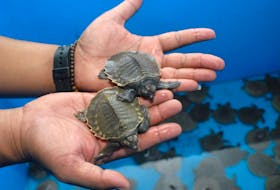What if you could spray away COVID-19?
That’s the idea behind an anti-viral surface coating being developed in a collaborative project between by researchers at The Waterloo Institute for Nanotechnology (WIN) within the University of Waterloo and SiO2 Innovation Labs.
The coating will kill the COVID-19 virus immediately upon contact with any surface.
According to Dr. Sushanta Mitra, Professor of Mechanical and Mechatronics Engineering and lead researcher on the project: “The COVID-19 virus can survive on surfaces for 24 hours or more. In order to protect front-line workers and the general public, it’s important that the virus be neutralized immediately when it comes into contact with any surface. Our work will culminate in the production of an anti-viral coating that will do just that.”
This research is multi-faceted and is being conducted by many different researchers at Waterloo, including chemical engineering professor Boxin Zhao and chemistry professor John Honek.
In a recent interview, Mitra said he thinks it will be six or seven months before preparations can be made to bring the product to market and he notes the huge advantages of working with SiO2 Innovation Labs, whose commercial and industrial coatings are made here.
“They already make materials to kill pathogens such as e-coli, they make anti-bacterial and anti-microbial coatings … We want the product to be made in Canada to help Canadians fight COVID, and hopefully make it available to the global community,” said Mitra.
In a release from SiO2 Innovation Labs, CTO Bruce Johnston said: “We’re thrilled to be collaborating with Professor Mitra and WIN in order to bring to market a surface coating that can neutralize pathogens quickly and their subsequent spread. Reduced infection rates will save lives and create safer environments in public and private spaces including homes, the work place, schools, stores, public transit and hospitality venues.
“Our history of creating and delivering safe, sustainable and environmentally friendly products is enabling us to meet this historic moment.”
Mitra’s research involves droplet transmission, viral load and interaction with various surfaces. The coating being developed will prevent droplet adherence even as it destroys the virus’ envelope — the lipid membrane — “because when you destroy that, you destroy the virus.”
Most of us learned about the virus ‘envelope’ from the information about the importance of hand-washing, soap being a surfactant.
The plan will be for the anti-COVID-19 material to be available in different forms, as a coating and also in spray or dip coat format.
Health workers can spray it on personal protective equipment (PPE) to repel (and destroy) viral droplets from masks or gowns; the coating can be used on door handles and high touch surfaces and floors.
“Once the economy is reopened and people go back to work, you’ll need this kind of coating,” said Mitra. “Clearing surfaces all the time is labour-intensive, but the coating lasts a long time.”
Do they have much competition for this product from other scientists?
“There are others working on similar products, and that’s good. There are eight billion people on this planet and we can’t meet the entire demand.”
As regards COVID-19, Mitra said: “The global effort is critical. We learn from each other, and that includes on a vaccine. We are all working to push as much knowledge as possible into the public domain.”
Mitra reminds us that The Waterloo Institute for Nanotechnology — which is Canada’s largest nanotechnology institute — is committed to UN Sustainable Development Goals.
“And one of the stated goals of the United Nations is good health for everyone,” he said. “This is our small effort in that direction.”
Copyright Postmedia Network Inc., 2020








